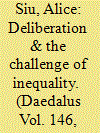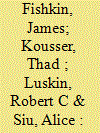| Srl | Item |
| 1 |
ID:
154147


|
|
|
|
|
| Summary/Abstract |
Deliberative critics contend that because societal inequalities cannot be bracketed in deliberative settings, the deliberative process inevitably perpetuates these inequalities. As a result, they argue, deliberation does not serve its theorized purposes, but rather produces distorted dialogue determined by inequalities, not merits. Advocates of deliberation must confront these criticisms: do less-privileged, less-educated, or perhaps illiterate participants stand a chance in discussions with the more privileged, better educated, and well spoken? Could their arguments ever be perceived or weighed equally? This essay presents empirical evidence to demonstrate that, in deliberations that are structured to provide a more level playing field, inequalities in skill and status do not translate into inequalities of influence.
|
|
|
|
|
|
|
|
|
|
|
|
|
|
|
|
| 2 |
ID:
142738


|
|
|
|
|
| Summary/Abstract |
Can the people deliberate to set the agenda for direct democracy in large scale states? How might such an institution work? The 2011 California Deliberative Poll piloted a solution to this problem helping to produce proposals that went to the ballot and also to the legislature. The paper reports on how this pilot worked and what it suggests about a possible institution to solve the deliberative agenda setting problem. The legislative proposal passed the legislature but the ballot proposition (Prop 31) failed. However, we show that the proposals actually deliberated on by the people might well have passed if not encumbered by additional elements not deliberated on by the public that drew opposition. The paper ends with an outline of how the process of deliberative agenda setting for the initiative might work, vetting proposals once every two years that could get on the ballot for a greatly reduced cost in signature collections. Adding deliberation to the agenda setting process would allow for a thoughtful and informed public will formation to determine the agenda for direct democracy.
|
|
|
|
|
|
|
|
|
|
|
|
|
|
|
|